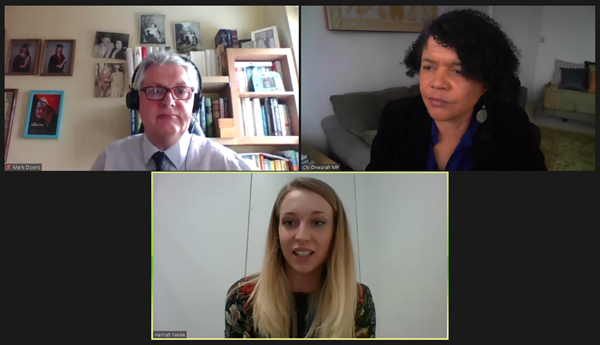Published: 04 Nov 2021
Category:
In March, early career representatives from learned societies across the STEM spectrum came together for Voice of the Future 2021. The annual event, organised by the Royal Society of Biology (RSB), reverses the format of a Parliamentary Select Committee, giving a panel of young scientists the opportunity to question senior Parliamentarians and their advisors on issues relating to science policy. The 2021 event was hosted online, rather than the usual location at Westminster.
First up to answer questions was Amanda Solloway MP, who at the time held the role of Minister for Science, Research and Innovation. Solloway began by outlining the development of a new R&D people and culture strategy, which aims to promote equality, stability, and mobility across the scientific sector. Solloway went on to talk about ARIA (Advanced Research & Invention Agency), a Government-funded initiative to support “high-risk, high-reward” research, promising fast and flexible funding decisions.
Following Solloway, Chi Onwurah MP, the Shadow Minister for Science, Research and Digital, highlighted that the pandemic has exposed the impact that science has on people’s everyday lives. Representing the British Pharmacological Society, Hannah Neale (Research Scientist at Sosei Heptares and a member of the Society’s Early Career Pharmacologists Advisory Group), asked what more could be done to educate and engage with the public about vaccine development and safety, to improve public confidence and vaccine uptake. In response, Onwurah highlighted the importance of understanding the roots of vaccine hesitancy in the BAME community, including historical racism within healthcare and medical research. She went on to describe the need to speak about the vaccine development process with transparency, and to tackle sources of misinformation, such as social media.

Hannah Neale questioning Chi Onwurah MP.
Up next was the Government’s Chief Scientific Advisor, Sir Patrick Vallance, by this point no stranger to being questioned on the science driving Government policy. Vallance began by reflecting on the lessons we could learn from the development of COVID-19 vaccines, expressing a desire for academics, small pharma, big pharma, regulators, and manufacturers to work in parallel going forward to develop medicines more efficiently. Vallance went on to acknowledge the need for more scientists in Parliament, remarking that most decisions taken by the Government will involve an element of science and technology, requiring scrutiny by critical thinkers. He ended by explaining that science always comes with a degree of uncertainty and requires constant self-correction, something which must be openly addressed to prevent the spread of misinformation.
Members of the House of Commons Science and Technology Select Committee took the stand for the final session of the day, including its chair, Rt Hon Greg Clark MP, Carol Monaghan MP, Dawn Butler MP, and Katherine Fletcher MP. The committee fielded questions on a range of topics, including their hopes for ARIA, plastic pollution, and the potential of hydrogen power as a zero-carbon fuel. At the end of the session, each MP shared a scientific discovery they’d like to see in their lifetime, with answers ranging from ending microbial resistance, to curing world hunger, and even human teleportation.
Reflecting on what she gained from the experience, Hannah Neale said “Representing the British Pharmacological Society as a member of the Early Career Pharmacologists Advisory Group at the Voice of the Future 2021 was extremely insightful. It was interesting to see how the MPs handled the scientific questions, and the biggest challenge was to get the MPs to provide a direct answer. I’m really grateful to the Society for providing this opportunity, which increased my exposure within the scientific community, and prompted me to think about the bigger scientific questions.”
Recordings of the event can be found on the RSB’s YouTube channel.
Comments
If you are a British Pharmacological Society member, please
sign in to post comments.